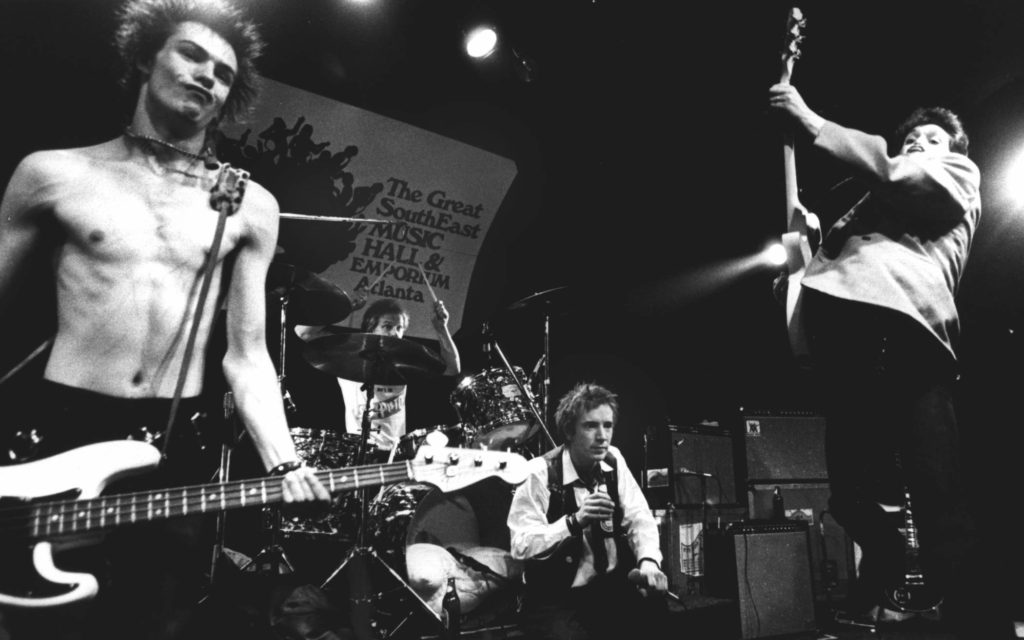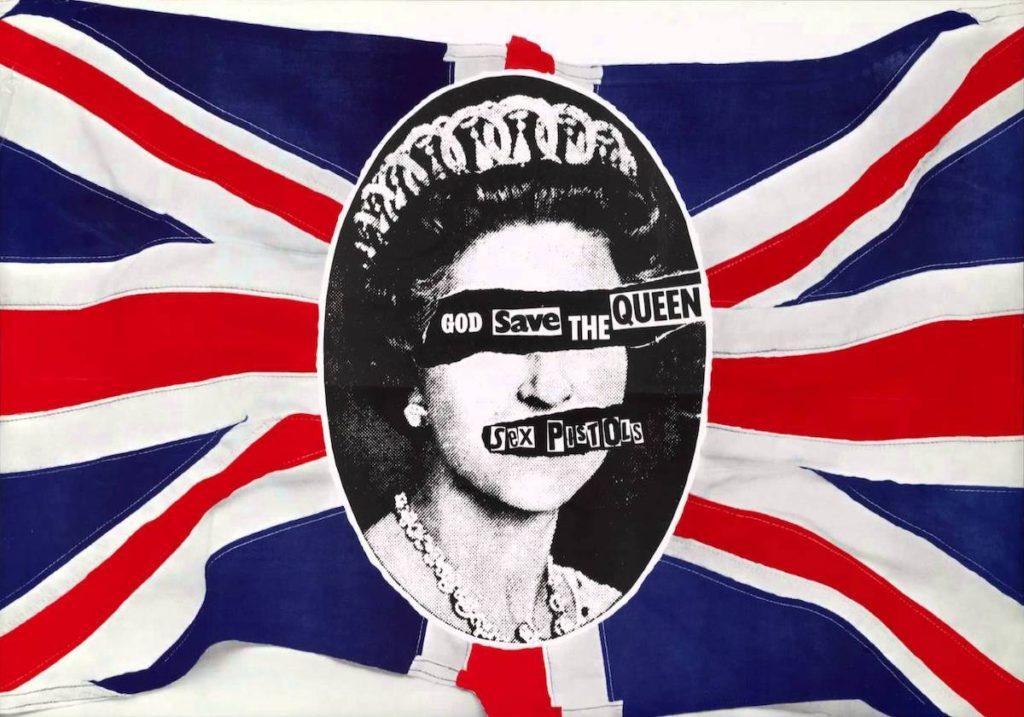Anarchy Unleashed: EMI’s 1977 Split with The Sex Pistols
In the chronicles of music history, few events reverberate with the seismic impact and controversy that surrounded EMI Records’ decision to drop the iconic punk rock band, the Sex Pistols, in 1977. It was a clash of cultures, a collision of raw talent and corporate sensibilities that shook the foundations of the music industry.

The Sex Pistols burst onto the scene in the mid-1970s like a frenetic hurricane, igniting the punk movement with their unabashedly rebellious attitude, confrontational lyrics, and anarchic energy. Their debut single, “Anarchy in the U.K.,” epitomized the band’s ethos, capturing the disillusionment and dissatisfaction of a generation in just a few electrifying minutes.

EMI Records, one of the UK’s major record labels at the time, signed the Sex Pistols in October 1976, amid a flurry of excitement and controversy. The band’s brashness and defiance were both their allure and their undoing. Their confrontational behavior and explicit lyrics, coupled with controversial incidents during live performances and interviews, quickly made them a lightning rod for public outrage and media scrutiny.
The relationship between the Sex Pistols and EMI Records was tumultuous from the start. The band’s first album, “Never Mind the Bollocks, Here’s the Sex Pistols,” was a raw and unapologetic manifesto that resonated with disaffected youth but incensed conservative elements in society. EMI, facing pressure from both the media and their own shareholders, found themselves at odds with the band’s unyielding attitude and controversial image.

As tensions escalated, the pivotal moment arrived in January 1977 when EMI officially severed ties with the Sex Pistols. The label cited the band’s behavior and public image as grounds for their decision, culminating in a terse and headline-grabbing press release that marked the end of the partnership. The industry was stunned, fans were divided, and the music world was left reeling from the aftershocks of this seismic split.
The fallout from EMI’s decision to drop the Sex Pistols would reverberate far beyond the confines of the music scene. It ignited debates about artistic freedom, corporate control, and the boundaries of expression in an increasingly polarized society.

The Aftermath: Impact and Legacy of EMI Records’ Decision
In the wake of EMI Records’ bold move to sever ties with the Sex Pistols, a maelstrom of reactions engulfed the music landscape. For the band, the split from EMI was a double-edged sword. On one hand, it further fueled their notoriety and cemented their status as punk provocateurs. On the other, it left them without a major label, plunging them into a precarious position in the industry.
Undeterred by the setback, the Sex Pistols found a new home with A&M Records, only to be dropped again within days due to public outcry and pressure from other artists on the label. Despite the challenges, the band pressed on, forging their path with the release of “God Save the Queen,” a scathing commentary on Britain’s socio-political landscape, which promptly soared to the top of the charts despite being banned by the BBC.

The controversy surrounding the Sex Pistols reached fever pitch during their infamous “Anarchy in the UK” tour. Concerts were canceled, venues backed out, and the media frenzy surrounding the band intensified. The tour culminated in the band’s fractious departure from the music scene, marked by their final show at the Winterland Ballroom in San Francisco.
Yet, the impact of the Sex Pistols’ brief but incendiary career reverberated long after their disbandment. Their influence on music, fashion, and cultural rebellion endures. The punk movement they helped spearhead evolved into a subculture that echoed their ethos of non-conformity and anti-establishment sentiment.

EMI Records’ decision to drop the Sex Pistols sparked a broader discourse about artistic freedom and corporate censorship within the music industry. It drew attention to the power struggle between creative expression and commercial interests, a debate that continues to resonate in today’s music landscape.
The legacy of the Sex Pistols persists as a testament to the raw power of music to challenge norms and provoke thought. Their audacious spirit and unapologetic defiance remain an indelible mark on the history of rock ‘n’ roll, inspiring countless artists to push boundaries and defy conventions.
The Enduring Legacy: Sex Pistols’ Lasting Impact on Music Culture
The story of the Sex Pistols doesn’t end with their disbandment or EMI Records’ decision to drop them. Instead, it reverberates through the corridors of music history, leaving an indelible imprint on generations of artists and fans alike.

Following their dissolution, the band members pursued various musical projects, with frontman Johnny Rotten (formerly John Lydon) founding Public Image Ltd. (PiL), a band that continued to challenge musical conventions while exploring new sonic territories.
Meanwhile, the legacy of the Sex Pistols endured, transcending the confines of the late ’70s punk scene. Their influence rippled across genres, inspiring not only musicians but also shaping fashion, art, and attitudes. The DIY ethos and anti-establishment fervor they embodied became a rallying cry for subsequent generations of artists seeking to disrupt the status quo.

In retrospect, EMI Records’ decision to drop the Sex Pistols served as a flashpoint that exposed the tensions between artistic expression and commercial interests. It propelled discussions about censorship, artistic integrity, and the role of record labels in shaping the music industry.
The punk movement, sparked and fueled in part by the Sex Pistols, became a cultural force that championed individuality, rebellion, and authenticity. Its impact extended far beyond music, influencing a spectrum of subcultures and artistic expressions, leaving an unmistakable mark on society’s collective consciousness.

Decades after their heyday, the Sex Pistols’ music continues to resonate with audiences, their songs serving as anthems of dissent and disillusionment. Tracks like “Anarchy in the U.K.” and “God Save the Queen” retain their potency, embodying the restless spirit of rebellion that defined an era.
As we reflect on EMI Records’ decision to drop the Sex Pistols in 1977, we recognize its place as a watershed moment in music history—a moment that ignited debates, challenged conventions, and ultimately left an enduring legacy that continues to inspire and provoke.

In conclusion, the story of the Sex Pistols and their tumultuous relationship with EMI Records stands as a testament to the transformative power of music and its ability to challenge the status quo, leaving an everlasting impact on culture and creativity.











